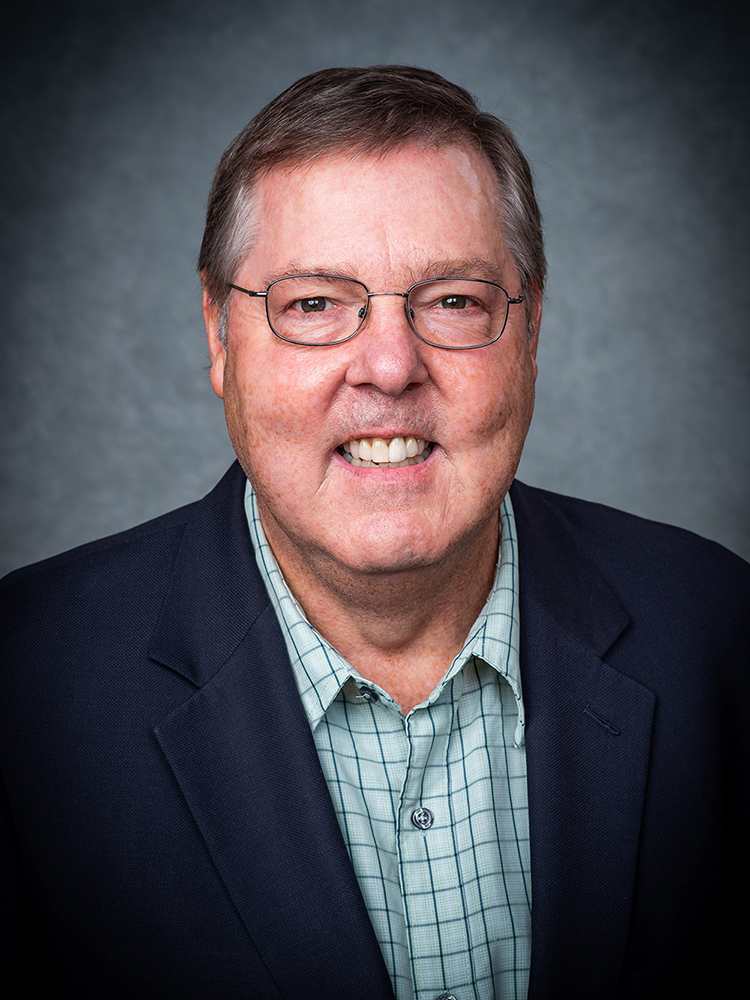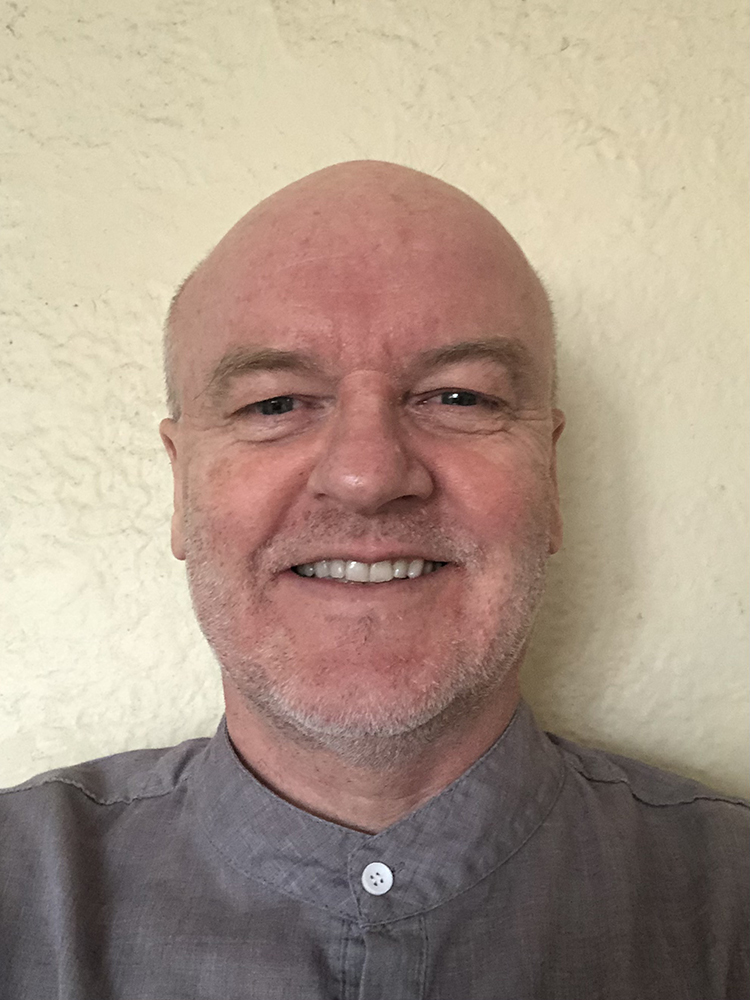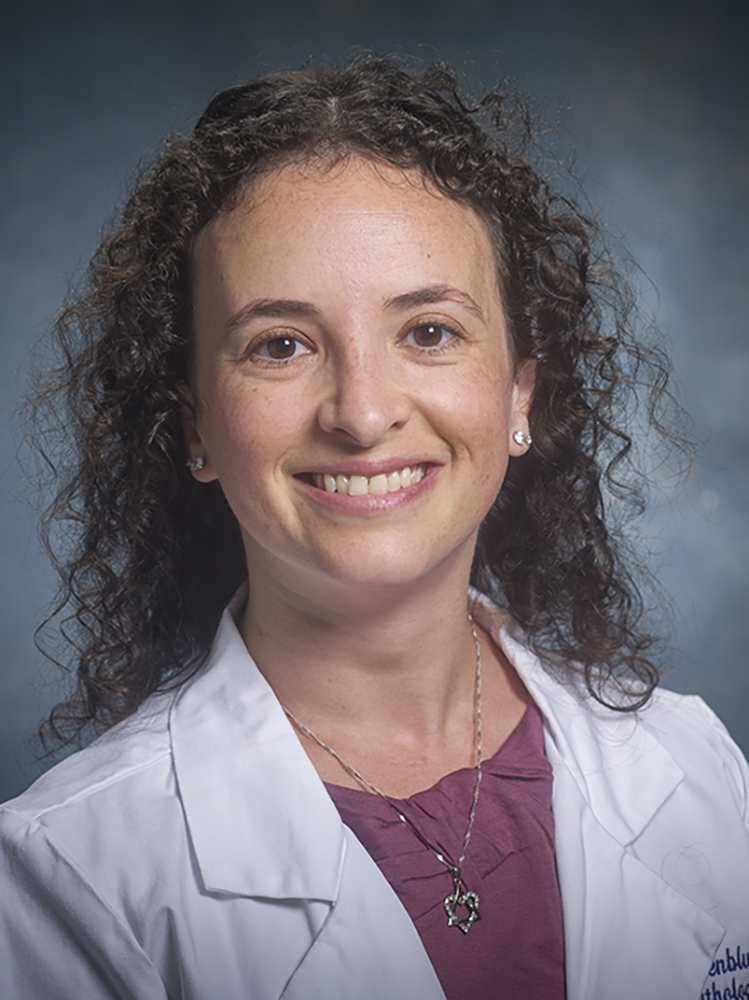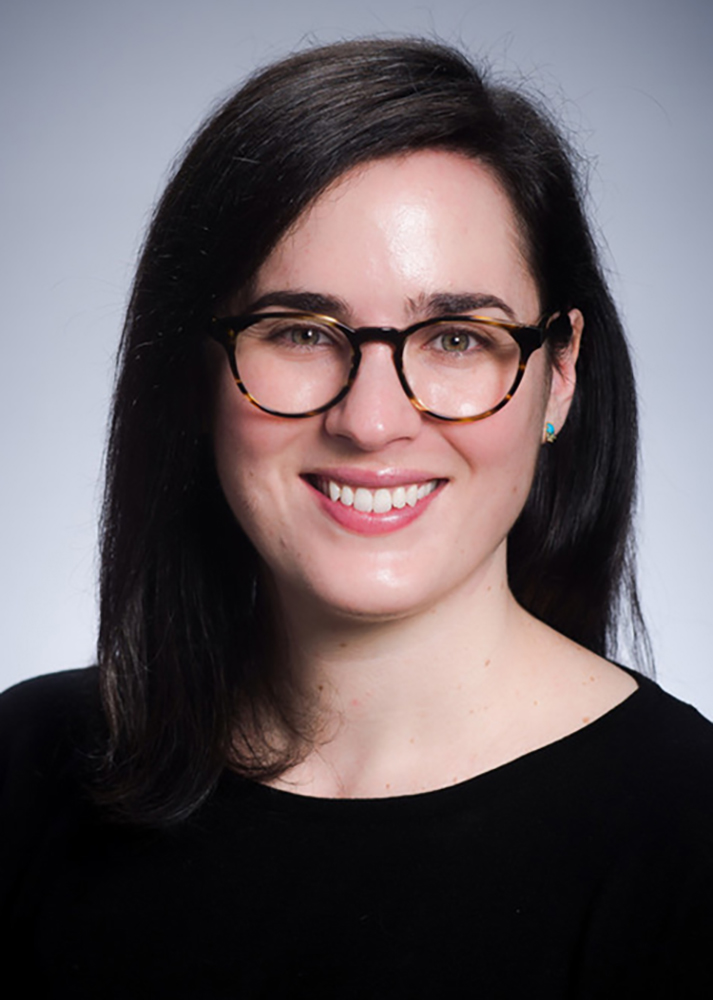Four outstanding educators from the School of Medicine were honored as winners of the 2021 Dean’s Excellence Awards in Teaching, an honor that recognizes recognizing exceptional contributions by School of Medicine faculty.
Peter Anderson, DVM, Ph.D., and Robin AJ Lester, Ph.D. are the two senior faculty winners; Frida Roseblum, M.D. and Rebekah Weil, M.D., are the junior faculty winners. Below, they share their inspirations and favorite aspects of teaching, along with tips for faculty looking for new resources in education.
Peter Anderson, DVM, Ph.D.
 Professor, Department of Pathology
Professor, Department of Pathology
How did you come to be interested in teaching?
When I was a pathology fellow the chair of our department, Dr. Jack Geer, was very active in teaching and he made it clear that teaching was an integral part of being an academic pathologist. He had established a pathology teaching office in our department that was overseen by Dr. Marshall Hartley. Dr. Hartley became a mentor and a good personal friend and by his actions he showed me what it takes to provide a superb learning environment of our medical students.
What inspires you to teach?
Of course I am a bit biased, but I am convinced that pathology is one of the most interesting and most important subjects for health profession students to learn and understand. Pathology is the study of disease and our students are here in medical school to learn how to take care of patients who have various diseases. So students tend to be interested in the material we cover. The thing that inspires me is to watch novice medical students grapple with this new material and then eventually become familiar with these topics and incorporate them into their lexicon.
What is your favorite aspect of teaching?
Pathology is an image rich subject and I am a believer in the old adage that “a picture is worth a thousand words.” So my favorite aspect of teaching is to demonstrate diseases and pathogenetic concepts/mechanisms using pathology images. To this end we have developed a pathology teaching website (the Pathology Education Instructional Resource, http://peir.net) with tens of thousands of digital pathology teaching images. We also have a virtual microscopy repository with histology and histopathology slides that faculty and students from all over the world can access and use for teaching and learning. Developing these online educational materials and watching people from all over the world benefit from them has been one of the most rewarding aspects of my teaching career.
Do you have a favorite course? Would you share why it’s your favorite?
I actually have two favorite courses. I started out teaching medical students 37 years ago and the medical curriculum is still challenging and interesting. Pathology is an integral part of a physician’s armamentarium and participating in the pathology education program is extremely rewarding. However as a PhD I also have an interest in graduate education and several years ago we developed a course for graduate students called Biology of Disease. This graduate course is also extremely rewarding since our goal is to teach graduate students about human diseases in order to enhance their acumen of translational research.
What resources do you recommend for faculty who want to learn or develop new skills in teaching?
When I started teaching many years ago there were few faculty developmental resources for health professional educators. I was fortunate to find kindred spirits in health sciences education and with them I was one of the founding members of the International Association of Medical Science Educators. This group has grown into a large robust organization that puts on an annual conference as well as frequent online faculty development webinars. Another excellent resource that early on I was selected to attend is the Harvard Macy Institute. There are now many different programs related to medical education, assessment, and leadership. And finally, there are numerous in-person and online programs that offer master’s degrees in Health Professional Education. Some of my colleagues have taken this route to enhance their knowledge and to build their credentials as educators. And most importantly, I have a supportive family. My wife is a nurse, my eldest son is a lawyer, my youngest son is an orthopedic surgery resident, and none of them have ever been shy about offering me suggestions on how to improve the way we teach our students. They have provided support and inspiration throughout my academic career for which I am most grateful.
 Robin A.J. Lester, Ph.D.
Robin A.J. Lester, Ph.D.
Professor, Department of Neurobiology
How did you come to be interested in teaching?
I was given the opportunity to teach a short course on neurophysiology to medical residents when I was a postdoctoral fellow. These classes showed me that the best way to understand a topic is by teaching it to others. It was a nerve-racking experience, but it was also enlightening. Subsequently, after joining UAB, I slowly became engaged in teaching in a variety of other courses, including gross anatomy of the brain — finding the hands-on approach with the medical, dental and optometry students thoroughly enjoyable.
What inspires you to teach?
I try to convey the personal excitement I have for the subject of neuroscience in a way that will spark curiosity in others. Creativity in both course design and implementation drives me, along with sharing this knowledge with the students and watching them become captivated by the information.
What is your favorite aspect of teaching?
I particularly like interactive teaching such as team-based activities that allow students to develop critical thinking, while honing their collaborative skills. I also enjoy watching students present formally their research projects.
Do you have a favorite course? Would you share why it’s your favorite?
I don’t really have a favorite course, but “One Hundred Things about the Brain” which is based on TED Talks, brain podcasts and lay science articles, continues to stimulate me because the focus is on topics that lie on the fringes of neuroscience, and generally outside the scope of most core neuroscience courses, such as dreaming, curiosity, time perception, navigation, and consciousness. Last fall I taught for the first time a course on the history of neuroscience to incoming undergraduates, which I found especially interesting because of its cross-discipline content.
What resources do you recommend for faculty who want to learn or develop new skills in teaching?
Originally, I came to admire and emulate the skills of my own high school teachers and undergraduate college professors. I have completed training on interactive course development and team-based learning, which I continuously rely upon when I’m in the design process. I try to become as knowledgeable on the topic as possible through reading, while trying to stick to the adage that less can sometimes be more in terms of the amount of material I present in class!
Frida Rosenblum, M.D.
 Assistant Professor, Department of Pathology
Assistant Professor, Department of Pathology
How did you come to be interested in teaching?
It was something that just happened and was never planned. It is part of the job and so I just ran with it, even though I absolutely hate public speaking and it freaks me out every single time. It started with just teaching the residents and fellows in pathology, then I volunteered for medical school, and it just grew from there.
What inspires you to teach?
I don’t think that I necessarily have an inspiration, but just do it and try to always be myself, true to myself and my personality, and teach in simple ways. I don’t rehearse or memorize anything, because I forget half the things I wanted to say anyways (too nervous!). That nervous energy somehow translates into enthusiasm and positive energy when I teach, and people catch on to that.
What is your favorite aspect of teaching?
Being me, which is somewhat of a goofball, and making people enjoy the lecture, hopefully learn and remember something, and maybe even laugh.
Do you have a favorite course? Would you share why it’s your favorite?
To me all lectures are the same, and I put the same level of energy and dedication to each, because I believe you should always try to do your best, regardless of the course or attendees.
What resources do you recommend for faculty who want to learn or develop new skills in teaching?
I have absolutely no clue, as I have never taken any course or training to develop my skills. I just try and identify my audience, keeping things as simple as possible even in complex topics, giving real life (and sometimes totally dumb) examples people can connect with.
 Rebekah Weil, M.D.
Rebekah Weil, M.D.
Assistant Professor, Department of Medicine
How did you come to be interested in teaching?
I really became interested in teaching during residency and more specifically during my chief medical resident year. I really loved working with learners to improve the clinical care of patients. After talking more with my mentors, I applied for a fellowship in medical education at OHSU, which only heightened my love and passion for teaching.
What inspires you to teach?
I am inspired to teach by learners and patients. Medicine is challenging in so many ways and I am constantly inspired by the residents and medical students who sacrifice so much to care for our patients. And I think that patients are great teachers- learning about a new medical condition or how it impacts someone stays with you and makes medical knowledge easier to remember.
What is your favorite aspect of teaching?
My favorite aspect of teaching is really understanding what the learner needs and then trying to give them targeted feedback to reach their goals. Plus it is really fun to work with residents and medical students!
Do you have a favorite course? Would you share why it’s your favorite?
I really loved school in general, but many of my favorite courses were centered around literature. I do love to read, but it was more that I had some incredibly professors in high school and college that made those classes amazing. A good teacher can really transform your learning experience.
What resources do you recommend for faculty who want to learn or develop new skills in teaching?
I have been really lucky to participate in multiple faculty development opportunities for teaching and recommend that anyone interested in improving their teaching skills keep an eye out for those when they are available. My biggest resource is really the mentors in my division and department and my peers- watching other great teachers at work is one of the ways I best learn to improve my skills.
